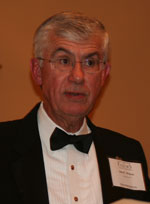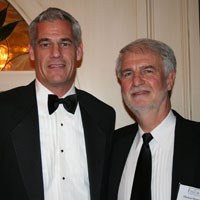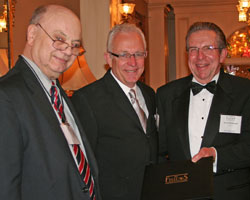Dec. 2, 2009 – Fourteen lawyers were inducted into the 2009 Class of Fellows of the Wisconsin Law Foundation on Nov. 10 in Milwaukee. Retired Wisconsin Supreme Court Justice Jon Wilcox was the guest speaker at the annual black-tie event.

Fellows of the Wisconsin Law Foundation class of 2009: Standing from left:
George K. Steil, Janesville;
James E. Hartwig, Janesville;
D. Michael Guerin, Milwaukee;
James A. Morrison, Marinette;
J Edward Clair, Delavan (Class of 2008); and
Carlton D. Stansbury, Milwaukee. Seated from left:
William R. Tehan, Wausau;
Patricia Jones D'Angelo, Waukesha; and
Kevin J. Wadzinski, Washington, D.C. Missing from photo:
David G. Anderson, Eau Claire;
Judge Thomas Cane, Wausau;
William J. Domina, Milwaukee;
Margaret “Peggy” Herlitzka, La Crosse;
Joseph R. Mirr, Eau Claire; and
Lon E. Roberts, Wausau.
The Class of 2009 is the 10th class inducted to the Fellows program, increasing membership to 209. Fellows are elected by the Fellows Board of Trustees. Individuals elected to the Fellows not only are outstanding lawyers but also individuals who contributed significantly to their communities, to the profession, and to the rule of law.
In his remarks, Wilcox noted that since his retirement in 2007, he has given “the speech” about his reflections on the supreme court many times. “While the honor of serving on the supreme court is humbling, controversy is close at hand,” he said, and so he shared his views about the unauthorized practice of law, judicial selection process, and judicial recusal.
Judicial selection process

Retired Justice Jon Wilcox shares his views about the unauthorized practice of law, judicial selection process, and judicial recusal.
Noting the sharp public debate about whether to change the judicial selection process to appointment, Wilcox said, “U.S. Supreme Court decisions such as Buckley v. Valeo and Minnesota v. White are going to be with us for a long time. Thirty-nine states have judicial elections. According to Minnesota v. White, the clause concerning speech must not be so restrictive as to violate the first amendment. The test is strict scrutiny.”
“In 2007, all seven justices on the Wisconsin Supreme Court signed a letter urging adoption of meaningful public financing. I think elections will continue, because I believe that the electorate wants elections – even though only 18 percent came out to vote.”
Unauthorized practice of law
“There is a need for a mechanism to address this problem,” said Wilcox displaying a placemat he saw in a restaurant, which read: “Paralegal services – estate planning, real estate, family, and much more.”
 2009 Class of Fellows inductee (left) Kevin J. Wadzinski with Mike Remington, both of Washington, D.C.
2009 Class of Fellows inductee (left) Kevin J. Wadzinski with Mike Remington, both of Washington, D.C.
Intrigued by this ad, Justice Wilcox set out to find the place of business. The sign outside of this downtown business reads: Affordable Legal Assistance, and offerings listed below the sign include: “Family law, estate planning, pro se divorce, divorce/paternity, child support, child visitation, wills, power of attorney, deeds, transfer returns, and others.”
“I have always opposed fence-me-in legislation, but I believe some consumer protection is warranted here,” said Wilcox. “The Wisconsin Supreme Court has the exclusive power to regulate the practice of law. The court’s regulation of the practice of law is intended to protect society from the harm that can result from the activities of unlicensed practitioners.”

(From left) Fellows Board of Trustees President Don Heaney, 2009 Fellow James Hartwig, and Fellows Membership Committee Chair David MacDougall during the presentation ceremony.
Quoting Abraham Lincoln, Wilcox said, “‘A lawyer’s time and advice are his [or her, added Wilcox] stock in trade.’ Think about it. The majority of other states that have adopted a definition of the practice of law and court rule to deal with the unauthorized practice of law. Our supreme court should do no less. I realize that in the areas of election and appointment and the recusal issue that there are many good arguments on both sides, but on the unauthorized practice of law question I urge you to get involved and let the court know your concerns.”
The supreme court has scheduled a public hearing for State Bar Petition 07-09 on March 8, 2010.
Judicial recusal
Referencing the Oct. 28, 2009, Wisconsin Supreme Court decision to amend the Code of Judicial Conduct so that the receipt of a campaign contribution from a party in a proceeding cannot be the sole reason for a judge to recuse him or herself, Wilcox said, “I am sure the court had Caperton v. Massey in mind, when it received these several petitions involving recusal. While Massey by its own majority decision has been characterized as an extreme situation and the constitutional standards application rare, I believe it has and will lead to more recusal disputes despite what the majority has to say.”

2009 Class of Fellows members Mike Guerin (left) and Jim Morrison enjoy the evening.
Wilcox pointed out that in Wisconsin recusal is different for the supreme court than it is in many other states. When a justice recuses him or herself, there is no replacement on the Wisconsin Supreme Court, which means the court could come in evenly devided with no decision on the merits of the case.
Offering an option that came before the Judicial Council several years ago that would alleviate the problem of the three-three tie, Wilcox recalled an idea from the late Judge Paul Gartzke that would permit a sitting appellate judge to be selected from a blind random draw to sit on the supreme court for cases when a justice has recused him or herself.
Deb Heneghan is the publications reporter for the State Bar of Wisconsin.
